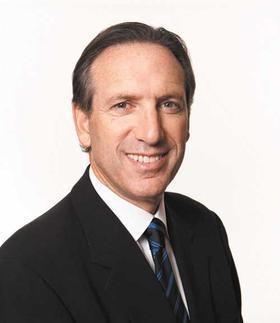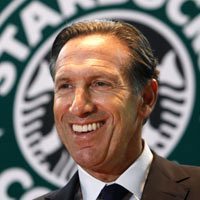Entrepreneurs
Why Howard Schultz Is So Successful
Howard Schultz is the American chairman and CEO of Starbucks. Although Schultz is most famous for his Coffee business, he was also the former owner of the Seattle SuperSonics and was on the board of directors at Square Inc.
Early Career
 Schultz graduated from Northern Michigan University with a Bachelor’s Degree in Communication and proceeded to gain employment as a Salesman, selling appliances for Hammerplast who sold European Coffee makers across the USA. In five years, Schultz had climbed the ladder to become director of sales and he observed that he was selling the most coffee makers to a small coffee business in Seattle, known at the time as Starbucks Coffee Tea and Spice Company. He was selling more to these few stores than he was to Macy’s.
Schultz graduated from Northern Michigan University with a Bachelor’s Degree in Communication and proceeded to gain employment as a Salesman, selling appliances for Hammerplast who sold European Coffee makers across the USA. In five years, Schultz had climbed the ladder to become director of sales and he observed that he was selling the most coffee makers to a small coffee business in Seattle, known at the time as Starbucks Coffee Tea and Spice Company. He was selling more to these few stores than he was to Macy’s.
Schultz knew he had to go to Seattle when the increase in numbers never stopped. He was selling more and more coffee makers to them every month. Schultz still fondly remembers the first time that he walked into the original Starbucks and at the time it was only 10 years old and only existed in Seattle.
Howard Schultz’s net worth is an estimated $2.6 Billion
Howard Schultz and modern Starbucks
 In 1982, one year after meeting with the founders of the original Starbucks, Schultz took the position of director of retail operations and marketing for the rapidly growing coffee business. At this time, they were only selling coffee beans and not coffee to drink. Zev Siegl, one of Starbucks’ co-founders highlighted Shultz’s “fabulous communication skills” as a major strength.
In 1982, one year after meeting with the founders of the original Starbucks, Schultz took the position of director of retail operations and marketing for the rapidly growing coffee business. At this time, they were only selling coffee beans and not coffee to drink. Zev Siegl, one of Starbucks’ co-founders highlighted Shultz’s “fabulous communication skills” as a major strength.
Schultz was determined to have a big impact on the company from day one and made Starbucks’ mission his own. It was whilst travelling Italy in 1983 that an important idea struck him. He realised that Starbucks should not just sell coffee beans but sell coffee drinks as well. He recalls that it wasn’t just the romantic idea of coffee, it was the sense of community and the connection between the people, the coffee and one another. He couldn’t wait to get back to Seattle and describe how he had “seen the future”.
“I think if you’re an entrepreneur, you’ve got to dream big and then dream bigger.” – Howard Schultz
 The company’s founders did not have the same enthusiasm for opening coffee bars within Starbucks’ stores and they insisted that it wasn’t for them. However, Schulz was persistent until the owners finally allowed him to open a coffee bar in a new store that was due to open in Seattle. It was an immediate success and it was attracting hundreds and hundreds of customers per day.
The company’s founders did not have the same enthusiasm for opening coffee bars within Starbucks’ stores and they insisted that it wasn’t for them. However, Schulz was persistent until the owners finally allowed him to open a coffee bar in a new store that was due to open in Seattle. It was an immediate success and it was attracting hundreds and hundreds of customers per day.
However, the rapid success of the coffee bar confirmed to the owners that they didn’t want to go in the same direction as Schultz and they didn’t want to get too big. A disappointed Schultz left Starbucks in 1985 to open a chain of coffee bars on his own, called Il Giornale and it quickly became successful.
“At an early age, my mother gave me this feeling that anything is possible, and I believe that.” – Howard Schultz
A couple of years later, Schultz was able to purchase Starbucks with the help of investors and merged Il Giornale with his former employers. He then became CEO and chairman of Starbucks, which was to be known as the Starbucks Coffee Company. Schultz had to use all of communication skills to bring investors around to the idea that Americans would pay high prices for a drink they were used to getting for 50 cents. At that time, most people weren’t aware of the differences between high quality coffee and the instant varieties, this was on top of the fact that coffee consumption was on the decline in the USA.
Schultz publicly resigned as Starbucks’ CEO in 2000, however, he returned as the company’s boss in 2008 and in 2009 he famously said, when describing Starbucks’ mission; “We’re not in the business of filling bellies; we’re in the business of filling souls.”
The Continued Success of the Starbucks Coffee Company
 The growth of Starbucks has allowed Schultz to be ranked in Forbes magazine’s “Forbes 400” list, which highlights the 400 richest people in the USA.
The growth of Starbucks has allowed Schultz to be ranked in Forbes magazine’s “Forbes 400” list, which highlights the 400 richest people in the USA.
There is no single company is selling more coffee to more people in more places than Starbucks. The company had expanded to include more than 17,600 stores in 39 countries all across the globe by 2012. By 2014, Starbucks had surpassed 21,000 stores with new stores reportedly opening every single day and the company now attracts in excess of 60 million customers per week.
Howard Schultz: 6 Habits of True Strategic Thinkers
Conclusion
Howard Schultz has combined incredible communication skills, persistence, strategic thinking and a clear vision to impact hundreds of millions of people’s lives and make himself a billionaire in the process.
Schultz’s story teaches us that although others may not share our vision, we have to remain true to what we believe is possible and pursue that vision anyway.
Business
Why Smart Entrepreneurs Are Quietly Buying Gold and Silver
When stocks, property, and cash move together, smart business owners turn to one asset that plays by different rules.

You’ve built your business from the ground up. You know what it takes to create value, manage risk, and grow wealth. But here’s something that might surprise you: some of the most successful entrepreneurs are quietly adding physical gold and silver to their portfolios. (more…)
Business
Why Entrepreneurs Should Care About AI Automation Testing
AI automation testing is quietly becoming the unfair advantage behind faster launches, fewer bugs, and startup growth that doesn’t break under pressure.

Faster than ever, the online world pushes entrepreneurs to build sharper tools while moving at full speed. Launching apps, services, or systems? One thing remains clear: fragile code slows everything down. (more…)
Business
Why Smart FMCG Entrepreneurs Outsource What They Can’t Automate
From label mistakes to premium gift sets, manual co-packing gives growing FMCG brands the speed, precision and flexibility in-house teams can’t match.

In the fast-moving consumer goods industry, success isn’t just about having a great product. It’s about speed, efficiency and knowing when to focus your energy on what truly matters. (more…)
Business
The Simple Security Stack Every Online Business Needs
Most small businesses are exposed online without realising it. This simple protection stack keeps costs low and risks lower.

Running a business online brings speed and reach, but it also brings risk. Data moves fast. Payments travel across borders. Teams log in from homes, cafés, and airports. (more…)
-

 News3 weeks ago
News3 weeks agoBrandon Willington Builds 7-Figure Business by Ignoring Almost Everything
-

 Health & Fitness3 weeks ago
Health & Fitness3 weeks agoWhat Minimalism Actually Means for Your Wellness Choices
-

 Did You Know3 weeks ago
Did You Know3 weeks agoWhy Most Online Courses Fail and How to Fix Them
-

 Business3 weeks ago
Business3 weeks agoIf Your Business Internet Keeps Letting You Down, Read This
-

 Business2 weeks ago
Business2 weeks agoEntrepreneur’s Guide to Pay Stubs: Why Freelancers and Small Business Owners Need a Smart Generator
-

 Business1 week ago
Business1 week agoThe Salary Shift Giving UK Employers An Unexpected Edge
-

 Business1 week ago
Business1 week agoThe Simple Security Stack Every Online Business Needs
-

 Scale Your Business1 week ago
Scale Your Business1 week ago5 Real Ways to Grow Your User Base Fast






























1 Comment